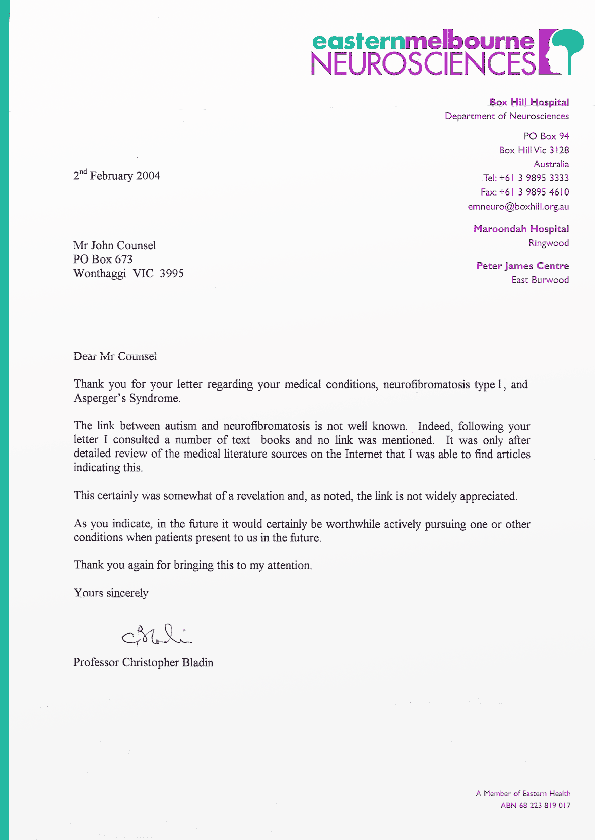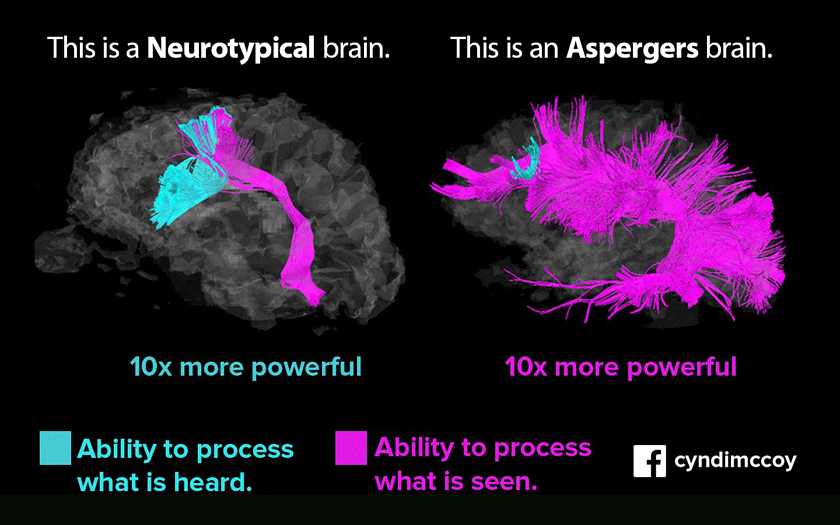By John Counsel
What is it?
The meaning of “Neural overload” — also called “sensory overload” — tends to depend on the person to whom you’re talking and their professional background. Like most things in life, the simplest explanation is often the best — provided, always, that it takes into account the latest known facts, especially in fields related to medical knowledge.
The problem is that medical science is so diverse and often insular, especially in the area of research.
An example of this is the widespread ignorance amongst neurologists and clinical psychologists of the connection between Autism Spectrum Disorders and Neurofibromatosis Type 1.
If even the specialists are unaware, what chance do you have with a General Practitioner?

So we end up with a range of terms, including Sensory Overload, Sensory Processing Disorder and more. Sensory overload has been found to be associated with other disorders and conditions such as:
- Attention deficit hyperactivity disorder (ADHD)
- Fibromyalgia (FM)
- Chronic fatigue syndrome (ME/CFS)
- Posttraumatic stress disorder (PTSD)
- Autistic spectrum disorders[6][7]
- Generalized anxiety disorder (GAD)
- Schizophrenia (see also sensory gating)
- Synesthesia
- Sensory processing disorder
In my own case, Neural overload — basically, jamming up of the relays along the synapses, dendrites and neurons transmitting signals to the brain — can be sensory to begin, then result in acute anxiety/stress — and shutdown, including serial shutdowns — once it crosses the stress threshold.

Here’s the REAL cause

Aspies may respond to anxiety and stress in many ways…
- Meltdowns — “fight or flight” automatic behavioural responses.
- Tantrums — similar, but may be caused by other factors, including perceived unfairness or betrayal, denial of access, frustration of desired outcomes, etc.
- Shutdowns — the subconscious mind may respond to neural overload and/or sensory overload by rendering the subject unconscious in order to protect itself.

In my own case, my subconscious mind has learned — over the past 30 years — to intervene with increasing speed to simply shut me down. Depending on the severity of the stress/anxiety, I may suffer repeated blackouts during which I’ll regain temporary consciousness, then lose consciousness, repeatedly, until the stress/anxiety dissipates.
In cases where neural overload is particularly severe, these episodes have lasted up to 12 or more hours for me. Often I’ll experience tell-tale warning symptoms like loss of balance, drowsiness or disorientation that allow me to protect myself from physical harm (lying down, sitting in a comfortable lounge chair or recliner, folding myself over a bench or table, etc).
I’m unaware of any lasting ill-effects or damage.
Update: January 2020
I’ve begun to wonder, since Christmas, whether these serial shutdowns might really be a form of dissociation, such as DID — Dissociative Identity Disorder.
I plan to explore this with both clinical psychologists and neurologists in 2020.
My best strategies for dealing with these episodes are…
- AVOIDANCE of situations that are likely to put me at risk of stress/anxiety.
- ESCAPE from situations that develop without warning. (May involve quickly removing myself to a nearby room, restroom, or my car.)
As I’ve mentioned in other Documents here, the key tends to be RECOGNISING the onset of symptoms, or changes in behaviour or attitudes of others.
It’s not enough to UNDERSTAND what happens during these situations. We need to be able to recognise that they’re actually happening to us — as early as possible.
I hope this is helpful to you in understanding these situations, whether they’re happening to you or your loved ones — especially children.
Developing AVOIDANCE and COPING strategies can help enormously. But they may be useless if we can’t RECOGNISE what’s happening to us and around us.

Learn more…
https://myaspieworld.home.blog/obstinate-resistant-volatile/
Columbia University Medical School Latest Research Findings
Comments
John Counsel: So many Group members have contacted me privately to ask what kind of massive neural overload I experienced last week — or even what a neural overload is, or is like, that I’ve posted this article here for permanent reference.
Thanks for your concern.
This episode was actually positive: I attended an event at which I met so many friends whom I haven’t seen in so long (some of them since 50-60 years ago), and learned of others who are terminally ill or have died, that the neural signals simply became too constant and frequent for my neural pathways to process. So my subconscious, in effect, said “This guy’s going to kill us unless we pull the pin and shut him down!”
Annette: When you say “losing balance” is one of the warning signs, does that include a sudden weakness and falling down? I wonder about this because my son has these falling down episodes. I had thought that they were due to not eating enough but now it seems it’s because of stress.
John Counsel: I’m not aware of any weakness, more a loss of vertical orientation. Interestingly, it’s never happened to me while driving.
Annette: That’s lucky that it’s never happened while driving.
John Counsel: I don’t think it’s serendipity, Annette. It may be because I’m holding the steering wheel — and the seat and seatbelt probably help. Several sensory supports can work wonders sometimes!
John Counsel: Someone recently suggested that I get tested for Orthostatic Intolerance Syndrome — OI. (The condition that forced one of the Wiggles to retire several years ago.) The difficulty is that, while almost all of the SYMPTOMS of OI are present when I have one of these episodes, the usual CAUSES of OI are not.
I’ve been tested for those causes during the extensive elimination testing I underwent last year following/during two episodes that occurred while I was actually in Box Hill Hospital.
The first one occurred when I was incredibly stressed while waiting to undergo surgery to remove renal stones (my right kidney was in the very early stages of failure) and, despite no fewer than SEVEN (7) visits from doctors (and teams of doctors) coming to see me over a two-day period, all of them promising to find out what time I was scheduled for surgery, not one did — and I had a spectacular meltdown after 33 hours of being ignored like this and requested to discharge myself to the supervising registrar, followed by multiple brief shutdowns until the orderlies arrived less than an hour later to take me to the operating theatre.
The second episode occurred several weeks later while heading to a consultation room in the cardiology department to have a halter heart monitor removed as part of the follow-up testing after the first episode — in this instance a medcall alert was issued and a team of specialists (including three neurologists) was able to observe and ask questions, perform tests, etc for an hour as I lapsed in and out of consciousness on a nearby bed.
OI symptoms are usually relieved when reclining. Mine aren’t.
The situation bears all the hallmarks of my subconscious mimicking other conditions in order to shut me down when neural overload happens.
This really is a frustrating condition, where I can’t even trust my own subconscious mind not to try to deceive me and any medical specialists involved. I guess at least I can rely on it to protect me from myself!
Sofia: John Counsel, have you read or heard of the work of Dr. Stephen Porges: the Polyvagal Theory? I was recommended to look at his theories on trauma recently and in listening to one of his podcasts this ‘sensory overload’ and ‘shutting down’ is exactly what he was talking about.
John Counsel: I have, Sofia, but the tests I underwent last year through the Neurology Department at Box Hill Hospital, and the detailed discussions with the Head of the department and his deputy head, concluded that the cause of these shutdowns was identical to that first identified in 1986 (surprising, because the knowledge base in neurology since then has increased massively).
Porges’ theory has a superficial similarity to my situation but, like many plausible theories, there are often disconnects with real-life causes.
For example, I don’t have irritable bowel syndrome, etc, but I do have Asperger’s Syndrome and Neurofibromatosis Type 1, and when I experience neural overload because of the excessive numbers of synapses in my body (susceptible to predominantly visual signals), I experience the kind of shutdowns he describes — but with intermittent repetitions as my subconscious mind restores tentative consciousness, apparently to monitor the level of external stimuli still detectable in my immediate vicinity. If my senses detect too high a level of stimuli, the shutdown and tentative recovery cycle continues until those stimuli subside to a manageable level.
Here’s how that works within the brain…

Sofia: Wow! Amazing imagery. Thank you for sharing. I have so much to learn about the Aspergers brain.
John Counsel: I have an Aspie-level interest in all this, so I research much of it “to death”. As a result, many crucial connections have been made that even most neurologists and clinical psychologists were unaware of at the time. Here’s an example from 2004 that I actually learned of in January 2003… (see image of letter from Professor Christopher Bladin above).
John Counsel: This precise sequence of indications happened to me on Tuesday evening, 31 July 2018. Our family in Melbourne joined us for a birthday dinner at our home to celebrate Naomi’s 36th birthday — around 20 people in total, including five Aspie boys under 10 years old.
Toward the end of the evening, as family members began breaking off into multiple conversations and small groups, I began losing and regaining consciousness, repeatedly. My family is so used to this by now that they just check that I’m safe and comfortable and leave me to come around, which I did as they began returning to their homes. Lynne checks me regularly to make sure I’m okay, but that’s how routine this process has become. It typically happens several times a week.
Once the detectable stimuli diminish to levels that are manageable for my neural pathways and brain, I regain consciousness. Recovery typically takes a short time and I often experience physical tiredness, even exhaustion on occasion, but no lasting effects appear to occur.
©2018 John Counsel. All rights reserved.
Learn more: Visit Aspergers Help Australia Facebook Page.


This information has helped me to recognise that my son, and most likely me and most of my family, have a neural condition rather than a behavioural problem. That is gold.
LikeLike
That’s really great, Kerri. Sorry this took so long to reply to — the stroke meant I couldn’t see or read much until now.
How are you and your son doing? It’s been a while since we were in touch. 😀
LikeLike